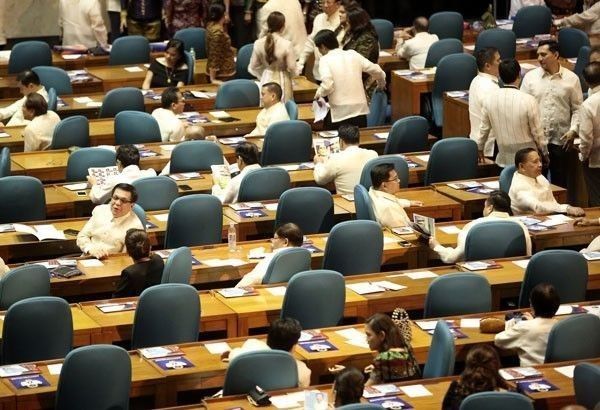Draft federal charter gets House nod

MANILA, Philippines — The House of Representatives approved on second reading yesterday a draft bill authored by Speaker Gloria Macapagal-Arroyo revising the 1987 Constitution’s current form of government into a presidential-bicameral-federal system.
Senators have been cool to a shift and Charter change through the two chambers voting as one and have said there is no more time to approve the move.
The measure was approved in plenary by a voice vote during deliberations presided by House Deputy Speaker Raneo Abu, where amendments to Resolution of Both Houses 15 presented by militant Rep. Antonio Tinio of party-list ACT were turned down overwhelmingly.
Leyte Rep. Vicente Veloso, chairman of the House committee on constitutional amendments, said the plenary is expected to approve on third reading Resolution of Both Houses (RBH) 15, which is separate from the federalism proposal of a consultative committee that President Duterte had created.
Rep. Rodante Marcoleta of party-list 1-Sagip, a deputy majority leader, moved during Monday night’s session that debates on RBH 15 be closed after no House member stood up to interpellate during the deliberations.
No less than members of the militant Makabayan bloc, specifically Rep. Antonio Tinio of party-list ACT, acknowledged to House reporters that Arroyo’s bill would be approved on second reading this week and on third reading next week.
“We’re dismayed that the majority moved to prematurely end debate on RBH 15. The House has thereby disgracefully discharged its function as a constituent assembly, with utter disregard for open and thorough discussion on proposed amendments to the fundament law of the land,” he said.
“The intent is clearly to rubber stamp the approval of a new constitution that will further tighten the stranglehold of political dynasties, undermine human rights and civil liberties and sell out the national patrimony and economy,” Tinio added.
The House resumed plenary debates in late November on Arroyo’s draft bill, amid repeated delays.
Veloso delivered his sponsorship speech while Zamboanga-Sibugay Rep. Wilter Palma II defended the Draft Federal Constitution, or the approved RBH 15, on the floor.
The measure was initially taken up in October, but was remanded to the Veloso committee after Arroyo discovered that the provision for joint voting of the Senate and the House remained, when she actually preferred separate voting of the two legislative chambers.
RBH 15 seeks to propose revisions to the 1987 Constitution, where under Arroyo’s draft charter, the (next) President (in 2022) will have a term of four years and will be entitled to one re-election – just like in the US.
“The only thing I added was a provision that instead of establishing the federal states, there’s a mechanism establishing the federal states. All the other provisions were already submitted by the Concom and everyone else,” Arroyo told reporters last October.
“That’s the only thing I added to make it my version,” the Pampanga congresswoman explained further, pointing out that lifting the term limits for senators would really be up to them, it being “a collegial decision.”
Under RBH 15, the form and structure of the government will be presidential-bicameral-federal.
The President and the Vice President will have the same powers and functions as stated in the 1987 Constitution. However, a vote for the President will also be good for the Vice President, and they should belong to the same party. In short, it’s a bundled vote.
The draft federal charter will also retain a bicameral legislative department where the House of Representatives will be composed of not more than 300 members, and the Senate composed of 24 senators.
A total of 80 percent of the House members will be composed of lawmakers from legislative districts across the country from Luzon, the Visayas and Mindanao, while the remaining 20 percent will comprise what is called the party-list lawmakers.
Members of the legislative branch will have a term of four years, as opposed to the current term of three years in the 1987 Constitution.
As for the judiciary, members of the Supreme Court and judges of the lower courts will be appointed by the President from a list of at least three nominees prepared by the Judicial Appointments and Disciplinary Council, which will be created to replace the Judicial and Bar Council.
Members of the SC will serve for a term of 10 years or until they reach the mandatory retirement age of 70.
- Latest
- Trending




























